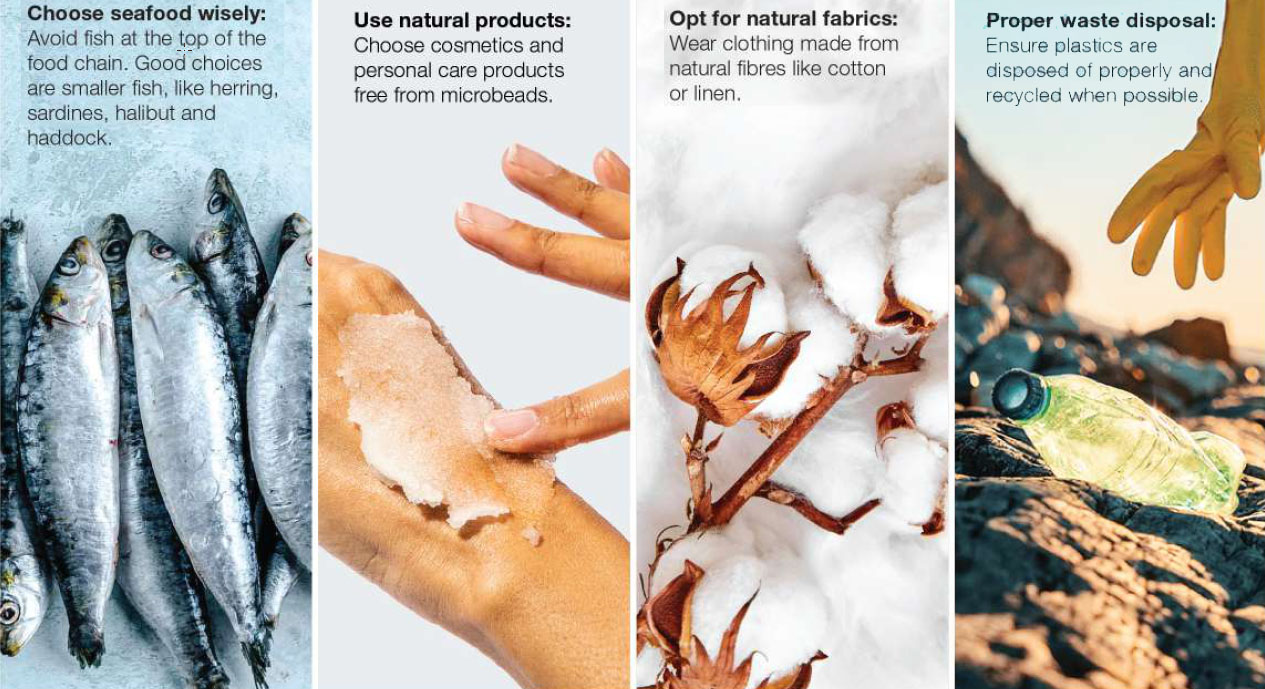Imagine tiny plastic particles, smaller than a grain of sand, scattered across the globe. These are microplastics, and they are invading our oceans, rivers and even the air we breathe. They come from broken-down plastic waste and everyday products like cosmetics and clothing. Microplastics pose serious risks to our environment and health, making it crucial for us to tackle this issue head-on.
What Are Microplastics?
Microplastics can be thought of as the glitter of the plastic world: tiny, pervasive, and hard to clean up. They fall into two categories: primary and secondary.
Primary Microplastics
These are intentionally manufactured small plastic particles.

Secondary Microplastics
These are fragments resulting from the breakdown of larger plastic items due to environmental factors such as sunlight, wind and wave action.

Implications for Environment and Health
Microplastics are silent invaders in our ecosystems. In the ocean, they are often mistaken for food by marine animals, causing physical harm like blockages in their digestive systems. Scientists from New Zealand and Australia recently detected microplastics in 75% of commercially caught fish.
On land, microplastics can infiltrate soil and freshwater sources, impacting terrestrial wildlife and potentially affecting crops. Although scientists are still studying the full extent of microplastics’ impact on human health, there is growing concern that they could cause inflammation, disrupt hormones, and even carry harmful bacteria.
While the full impact of microplastics on human health is still under investigation, we know enough about their potential harms to warrant taking action. Proactively reducing exposure and supporting our body’s natural detoxification processes can have a significant impact.
Steps to Reduce Your Exposure
While it’s impossible to eliminate all microplastics from the environment, there are steps you can take to reduce your exposure. Here are a few tips to get you started:

Strategies for Detoxing Microplastics
Detoxing your body from microplastics is like spring cleaning your home—it’s about removing unwanted substances and supporting your body’s natural ability to cleanse itself.
Dr. Lynn’s Detoxification & Rejuvenation Programme (DRP)
Dr. Lynn’s Detoxification & Rejuvenation Programme (DRP) is an excellent method for detoxifying your body from microplastics and other accumulated toxins. The DRP supports your body’s detoxifying organs and rejuvenates your cells and tissues by supplying a wide array of high-quality nutrients. It’s an ideal way to kickstart your health, rebuild your immune system, and get your body back on track.
Additional Lifestyle Tips
Hydration
Drinking plenty of water is essential. Water acts as a natural flush, helping our kidneys filter out toxins and microplastics. Aim to drink at least a glass of water every hour for the first 10 hours upon waking up.
Fibre-rich Diet
Eating foods high in fibre, such as fruits, vegetables, and whole grains, can help. Fibre works like a scrubbing brush, sweeping through our digestive system and aiding in the elimination of toxins. Herbal Matrix Powder/Herbal Klenz is a highly recommended fibre supplement.
Probiotics
Probiotics like lactobacillus and bifidobacterium can help break down chemicals from plastics in our gut. Immuflora contains both of these probiotics in ideal amounts.
Antioxidants
Consuming foods rich in antioxidants, like berries, nuts, and leafy greens, can protect your cells from damage caused by microplastics. Antioxidants help neutralize harmful chemicals that microplastics might release. C Complex, CoQ10, Collasta+, and Super Green Food++ are rich in antioxidants that can reduce the oxidative stress caused by microplastics.
Regular Exercise
Exercise boosts your circulation and helps your body eliminate toxins through sweat, the liver, and kidneys.
Avoid Processed Foods
Processed foods can contain additives and chemicals that burden your body’s detox systems. Eating whole, unprocessed foods supports your body’s natural detoxification.
Reduce Plastic Use
Minimizing your use of plastics can reduce the number of microplastics you ingest. Use glass or stainless steel containers and avoid plastic-wrapped foods when possible. If you need to use plastic containers for water or food, ensure the contents are not hot when placed in the containers and that they are not exposed to heat.
Distil Your Water
We learned earlier that increasing water intake is one of the most effective ways to detoxify the body. But make sure the water is not adding to the problem. Drinking distilled water can help avoid microplastics and other pollutants that may be found in water sources.
Actionable Advice
You don’t need to transform your life all at once to see an impact. Begin with small, manageable changes and gradually build on them. Drink an extra glass of water daily, add more vegetables to your meals, or opt for a reusable water bottle instead of a disposable one. These simple choices help detoxify your body from microplastics and contribute to a healthier planet. Remember, every small step counts, and over time, these changes can lead to significant health benefits.
